Tina Hallis's Blog, page 3
November 19, 2023
Being Kind by Saying “No”
Can you set boundaries from a place of calm and kindness? We often end up confronting these issues when we’re frustrated or feeling guilt or regret.
Think of an event or project that you’ve volunteered for or just helped out with in the past. Maybe it was hosting a family holiday. Maybe it was taking a role in your local church, charity, or nonprofit organization. Or it could just be a chore or task (at work or home) you always do.
Now imagine you don’t want to do it anymore. You have to tell other people that you are withdrawing your help. Maybe you’re expecting them to be disappointed in you or to push back and say you can’t quit.
If you’re a people pleaser, you might ignore your own needs or preferences and agree to keep giving. You may think you’re being kind, putting other people’s needs first. But being kind to others at the expense of being unkind to ourselves often backfires. It can make us resentful. It can leave us feeling overwhelmed and overcommitted. It can drain our battery and hurt our well-being.
I’ve learned (often the hard way), that the best approach is to take action when I’m feeling good, before I feel upset, before I feel guilty. I focus on what I need and remind myself that I’m being kind by filling my own cup. Because when I’m kind to myself, I have more capacity to be kind to others.
A reminder, i t’s about finding balance between being selfish and selfless so we can be self- ful .
Give it a try on something easy this week and see how it goes to say “no” from a positive mindset (your sage).
September 10, 2023
What Makes a Chicken Happy?
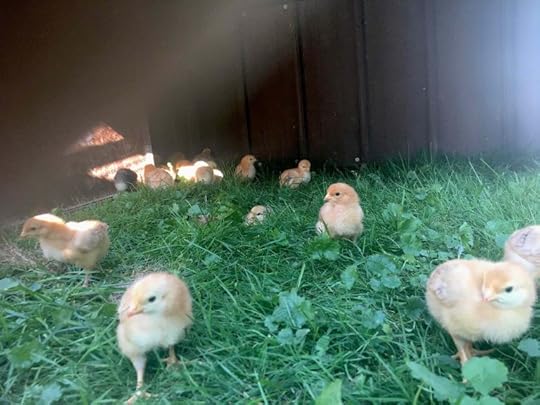
A couple of weeks ago, we received 40 baby chicks in the mail. This is the third year we’ve raised them. I’m amazed at how much I enjoy seeing them grow from little fuzz balls to big brownish-red chickens.
After a week, we move the heated brooder from the garage to the chicken tractor outside, where they can safely explore the grass and forage for bugs and weeds. Every night, we put them safely back in the brooder, and every morning, we open the door to a big new world. They are so excited to run outside! They flap their wings and jump around. Every time I walk over to see them, they come rushing up to see if I’ve brought them a treat like a handful of dried worms. I like to sit on the grass and watch them as they sleep, explore, eat, and play. I find it very peaceful and grounding.
My goal is to raise healthy chickens that have had a good life. When possible, I want to know where my food comes from and how it was raised.
So what makes a chicken happy? What are the main ingredients for a good life for them? Space to run around. Fresh air. Fresh grass and weeds. Water and feed. Sunshine. Bugs. Simple things. Every day, when I fill their water and feed, I think, “It’s a good day to be a chicken.”
I think about my dog and three cats. What are the main ingredients for a good life for them? Pets. Food and water. A safe place to sleep and play. Love and attention. It’s always a great day to be a dog when Tyson gets pets, but it’s even better if someone throws a stick or frisbee for him to fetch.
I bet you know where this is going. What makes you happy? What are the main ingredients you need for a good life? And how can you make today a great day to be alive? Keep it simple.
August 6, 2023
Feeling Stressed? Try a Different Perspective

What problems, worries, or frustrations have been on your mind recently?
Lately, we’ve been concerned about the cost of out-of-state tuition for our daughter as she starts college. The reality of the student debt she’s going to incur makes us wonder if we should have pushed harder to persuade her to stay in-state. She’s wanted to go to college far away from home for years, and she’s the kind of person who knows what she wants.
My perspective shifted after talking to a family member who is deeply troubled about their grandson’s struggles with drugs and brushes with the law. It’s a relief for them that he’s currently in jail, as at least they know he’s somewhat safe. And then, I was reminded of a friend whose son has some challenges and has no motivation to go to school or get a job. He just wants to stay in his bedroom and play video games.
Phew! I’ll take the stress of my daughter’s debt any day over the stress of these other families.
Lately, we’ve also had frustrations with a home project. We decided to replace our garden fence, which was meant to keep the deer away. My husband, who’s pretty handy, took on the task, but it’s been more frustrating and time-consuming than we ever expected.
But then my perspective changes when I pause and think about the work I’ve been doing with Dr. Lori Bouchard. I assist her with Discovery Calls for people with cancer who are seeking alternative treatments. Every week, I hear from individuals who are dissatisfied with their current treatment or are grappling with cancer’s recurrence. Their situation and fear remind me to appreciate my health and to realize my other stressors are temporary and small.
I’m not saying we should pretend our challenges don’t exist, but often if we look around, we can put them into a different perspective so they seem more manageable.
July 23, 2023
The Difference Between Optimists and Pessimists
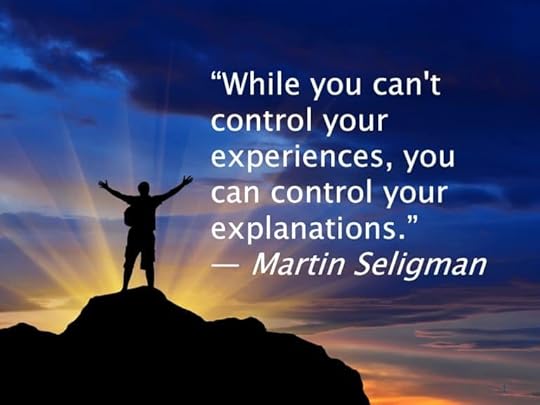
Life can be hard!! Losing a job or failing in business can be downright scary and discouraging. Getting rejected from our dream college can feel devastating. Then there’s the frustration of not being able to afford the things we want. It’s like the universe is against us, and nothing seems to go right.
When life throws us a curveball, how do we respond? Do we let ourselves become victims, throwing in the towel? Or how do we get better at picking ourselves up and mustering the courage to try again or find a new path?
Martin Seligman, known as the Father of Positive Psychology, introduced a concept called “learned optimism” and highlighted the key differences between optimists and pessimists in three crucial areas.
Personalization – When something goes wrong, pessimists tend to take it personally, seeing it as a reflection of their own inadequacies. They internalize the struggle, thinking they’re just not good enough. Optimists see it as a bad situation that does not define who they are or what they are capable of. Pervasiveness – If one thing goes bad, a pessimist carries it over to other parts of their life, too. If something goes wrong in one area, they start believing they’re failing in every other aspect too. It’s like a domino effect of negativity. An optimist understands that a struggle in one area doesn’t mean their whole life is falling apart. They can compartmentalize and keep a positive outlook in other areas. Permanence – A pessimist believes that if something is hard or bad, it will always be that way. The optimist believes circumstances can improve and situations can get better with time and effort.As my daughter transitions from high school to college, it strikes me that school teaches us a lot of subjects; math, English, science, etc., but they often neglect to equip us with the essential life skills we need to thrive, like how to build our optimism.
So the next time life throws you a curveball, find more optimism by remembering not to take it personally, not to let it affect other areas of your life, and that it is temporary.
June 18, 2023
From Irritation to Understanding: Harnessing the Pause-Notice-Choose Approach to Be Your Best Self

I was in another room when I heard my husband yelling from the kitchen, asking why I hadn’t taken out the garbage. I instantly felt annoyed and responded in an irritated tone, saying that I didn’t know I was supposed to do it.
Naturally, my husband got irritated by my tone and gave a defensive retort, which only increased my annoyance. Eventually, I realized that I had misunderstood him. He had actually asked if he should take out the garbage!!
Has a misunderstanding ever caused you to get unnecessarily annoyed? Maybe it even led to an argument or hurt feelings?
Now, let’s consider another situation. You’re feeling stressed, trying to deal with a problem, but the other person is in a playful mood. They’re trying to be funny or silly. I can appreciate their mood if I’m also feeling lighthearted or relaxed, but there are times when it can frustrate me. The result? I end up responding with a less-than-nice tone.
I don’t like the person I become when I’m annoyed. I want to be patient, understanding, and easy-going. Can you relate?
One approach that has greatly helped me is to pause, notice, and choose. Does this sound familiar? I’ve talked about it a lot, but these are more examples where it can improve our lives and relationships.
Before I speak, I try to pause and notice. Has this situation triggered me? Am I feeling irritated or defensive? Now I realize that it’s my saboteurs speaking. With some effort, I refrain from blurting out the first words that come to mind. It’s not my true self speaking; it’s just my survival instinct.
Now I can choose. I can choose to approach this situation with curiosity. I can choose to stay calm. I can choose to assume the best intentions on their part.
I’m far from perfect, but I believe that practicing and improving this approach has profoundly helped me become a kinder person and show up as my best, most patient self more often. Give it a try!
May 14, 2023
Listen to the Warning Signals – Is It Time for a Change?

Have you ever felt like you couldn’t do your best work because you didn’t have enough time or the right skills? Have these types of situations ever made you doubt your abilities or shaken your self-confidence?
I can remember different times in my life when I’ve felt this way; incapable, overwhelmed, and even disappointed in myself. And I’ve seen it happen in the lives of family and friends.
I have bad memories of one particular job I had. After I started, I wondered if they had hired the wrong person. Maybe they were looking at someone else’s resume? I felt like the role wasn’t a good fit. The expectations and projects weren’t a good match for my skills. I wanted to make a contribution, but it seemed like I was spinning my wheels.
I would come home so frustrated and sometimes in tears. After a year, I finally realized I had to leave; it wasn’t going to get better. And staying was eating away at my self-worth and self-confidence. It took me at least six months at a good job to recover my belief in myself.
Here’s what I’ve learned and wished I’d known back then. These feelings are warning signals that we need to reassess our choices. Maybe we’ve said “yes” to too many things. Maybe we’ve said “yes” to things that aren’t a good fit for our passion or our skills. Maybe we need to cut back on our commitments. We may even need to take a major step back and reassess our job or career.
If we don’t take action, these feelings of inadequacy can eat away at our soul and send us into a downward spiral. The longer it lasts, the harder it is to recover.
Are there any warning signals you need to listen to? What actions can you take?
April 16, 2023
How Do You Make Others Feel? A Critical Way to Improve Relationships and Interactions
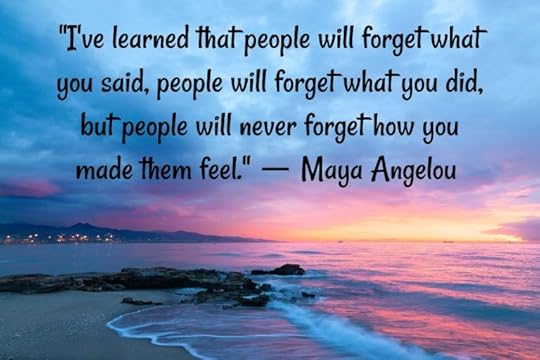
Have you ever stopped to think about how you make other people feel? Whether it’s a loved one or a difficult colleague, do they feel better or worse after interacting with you?
Do they feel heard? Smart? Empowered? Understood? Validated? Respected? Capable? Valued? Appreciated?
It’s a challenge we often overlook. We get caught up in our busy lives, distractions, and our own needs, and we don’t always consider how our words and behavior affect those around us. But let’s take a moment to reflect on a few situations.
How often do you offer advice instead of asking for it? Offering advice can make us feel helpful, smart, and capable of fixing problems. But sometimes, it can also make the other person feel inadequate or that we don’t think they are capable. However, when we ask for their ideas to help with our problems, we show trust, respect, and empowerment. This holds true even with our kids. They want to feel included and that their ideas matter.
How often do you judge or criticize instead of showing curiosity? It may be subtle, but the underlying message is clear – disapproval or disagreement. The other person may feel defensive, disconnected, or misunderstood. They are less likely to share their ideas, mistakes, challenges, or feelings with you in the future. You may feel like you were in the “right.” The other person needed correction, maybe even discipline. But what if they’re already feeling bad? Instead of dragging them down further, maybe you can help them find the learning or growth.
Our survival instinct pushes us to look smart and capable in front of others. It wants us to appear strong. However, by helping others feel this way, we can boost their self-worth and mood.
You might be wondering what their feelings have to do with your happiness. But here’s what I’ve learned – how we make others feel is one of the biggest ways we influence their mood. And their mood can easily impact our own mood. It’s like emotional contagion, where emotions can spread from person to person. But it doesn’t stop there – the way we make others feel also impacts the effectiveness of our communication, the strength of our connections, and the quality of our overall relationships.
Pick a couple of people in your life, and this week, see if your interactions can make them feel even better than usual.
April 9, 2023
My New Mantra – Enthusiasm without Attachment

My daughter will be graduating from high school in less than two months. It’s a time of big changes and big decisions. And many of them are outside my control. She wants to go to school far away. How will she do on her own? Will she find a major she loves that can also get her a good job? As I grappled with my feelings and fears, these words came to me – enthusiasm without attachment. I want to remain enthused about the possibilities without having my happiness depend on the outcomes. This idea reminds me of the quote by Byron Katie,
“I am a lover of what is, not because I’m a spiritual person, but because it hurts when I argue with reality.”
Now I’m finding multiple situations where these words seem to fit. I’m working on a project to create an online course related to health and lifestyle choices. I can offer my opinions to the team, but I’m not in charge of making the decisions. There are times when I wonder about their approach or their ideas. But I love this project, the team, and the organization, and I’m excited to be part of it. I remind myself to stay enthused but unattached to the outcomes.
A large parcel of land came up for sale that’s adjacent to our property. We’ve been hoping to purchase it for years. We can see the property line from our dining room, and we really don’t want to have a new house right there. This may not seem like a big deal, but we live in the country, and our current closest neighbor is a quarter mile away, and you can’t see our house from the road. We love our privacy. But the land went for a lot more than the asking price, and we didn’t get it. So we are trying to stay enthused about having new neighbors while not being attached to the outcome. Where will they build their new house? Will they be nice neighbors?
What situations in your life could benefit from staying enthused without attachment? What would that look and feel like?
March 12, 2023
Are You Putting Energy into the Relationships that Matter Most?
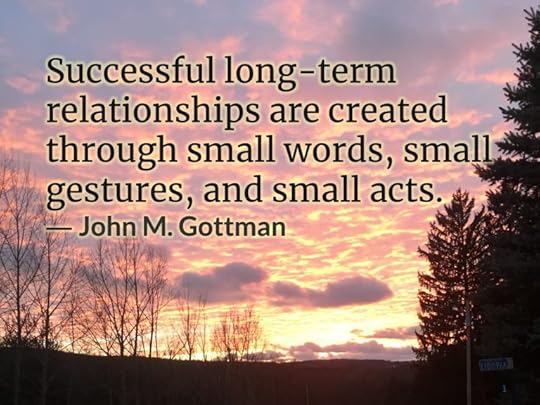
Think of a time when you wanted another person to like you. Maybe it was when you were dating. Maybe it was a new boss. Think back to how you tried to be your best self. Maybe you listened more. Maybe you offered more compliments and appreciation. Maybe you were more understanding of their imperfections. Maybe you tried to understand their bad moods.
Notice I didn’t say anything about trying to impress them, although that may have been on your mind, too. No, I’m just talking about how you likely made an extra effort to be nice.
Now think of what version of yourself you currently bring to your interactions with your coworkers, your kids, your partner, etc. On a scale of 1 to 10, with 1 being your worst self and 10 being your best, what would you rate it? If you’re like some people, you probably tend to put more effort in at work and have little energy left when you get home.
Do you get more snippy with your family? Do you judge, get defensive, or just let all your stress out with those people you’re most comfortable with in your life?
What if you saved a little effort and energy for your relationships at home? What if you could increase your rating by even one or two points? What if you were almost as friendly, patient, and understanding with your kids, partner, parents, etc. as you were with someone who you wanted to like you?
This realization has been a huge eye-opener for me. Why would I put the least effort into the relationships that matter the most to me? I think this thought started creeping in a few years ago when I realized that my daughter would be leaving home after high school in only three years. Now she only has a couple of months of school left!! It also reminds me of the studies showing that our relationships with our partner and kids are best when we have a positivity ratio of at least 5 – 5 positive interactions for every 1 negative interaction.
February 5, 2023
Go Ahead and Cry
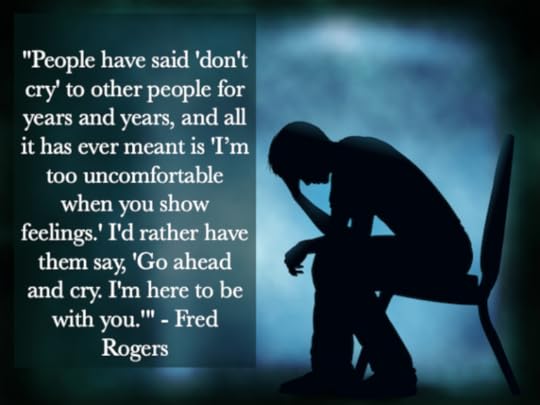
I’m at the store and notice a mom with a small child. I quickly catch on that the child is holding a toy they want their mom to buy for them, but the mom is telling them to put it back. The child is upset and starts to cry. What do you think happens next? What does the mom say?
You probably guessed something like, “Stop crying!” or “That’s nothing to cry about.” or “Stop acting like a baby.”
We’ve probably seen one or more of these responses before – or maybe we’ve even been the one saying them. It seems that this is what we’re expected to say. But do these comments solve the problem? Does the child feel better?
It’s not just parents. Society encourages us to hide our feelings, to act like things are OK when they’re not. Sure, sometimes that’s necessary to get through a situation, but if we never allow ourselves to feel our feelings, it can cause physical and emotional problems now and even later in life. Instead of processing and moving through these negative emotions, we can get stuck.
What if the mom had said, “I know it’s hard when you want something you can’t have. It’s OK to be sad or upset.” Would the child have felt heard and understood? Would they have calmed down sooner? Maybe.
What if we told ourselves, “This is a difficult situation, and it’s OK to feel discouraged, angry, frustrated . . . ” What if we gave ourselves some empathy and some time to work through our emotions?
Now, when a friend or family member has had a bad day or is going through a tough time, I try to remember to validate their feelings instead of trying to offer advice right away.
Who can you hold space for? A friend, family member, coworker, or yourself?
“People have said ‘don’t cry’ to other people for years and years, and all it has ever meant is ‘I’m too uncomfortable when you show feelings.’ I’d rather have them say, ‘Go ahead and cry. I’m here to be with you.'” – Fred Rogers



